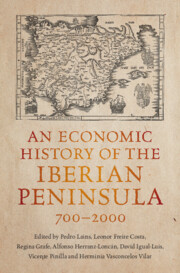Book contents
- An Economic History of the Iberian Peninsula, 700–2000
- An Economic History of the Iberian Peninsula, 700–2000
- Copyright page
- Contents
- Figures
- Tables
- Contributors
- Preface: By Way of Presentation
- Introduction
- Part I The Making of Iberia, 700–1500
- Part II Globalization and Enlightenment, 1500–1800
- 10 Patterns of Iberian Economic Growth in the Early Modern Period
- 11 Population of the Iberian Peninsula in the Early Modern Period: A Comparative and Regional Perspective
- 12 Institutions and Policy, 1500–1800
- 13 Early Modern Financial Development in the Iberian Peninsula
- 14 Science, Knowledge and Technology, 1500–1800
- 15 Living Standards, Inequality and Consumption, 1500–1800
- 16 Trade and the Colonial Economies, 1500–1828
- 17 The Economic History of Iberia in a Wider Context, 1500–1800
- Part III Industrialization and Catching Up, 1800–2000
- References
- Index
14 - Science, Knowledge and Technology, 1500–1800
from Part II - Globalization and Enlightenment, 1500–1800
Published online by Cambridge University Press: 22 February 2024
- An Economic History of the Iberian Peninsula, 700–2000
- An Economic History of the Iberian Peninsula, 700–2000
- Copyright page
- Contents
- Figures
- Tables
- Contributors
- Preface: By Way of Presentation
- Introduction
- Part I The Making of Iberia, 700–1500
- Part II Globalization and Enlightenment, 1500–1800
- 10 Patterns of Iberian Economic Growth in the Early Modern Period
- 11 Population of the Iberian Peninsula in the Early Modern Period: A Comparative and Regional Perspective
- 12 Institutions and Policy, 1500–1800
- 13 Early Modern Financial Development in the Iberian Peninsula
- 14 Science, Knowledge and Technology, 1500–1800
- 15 Living Standards, Inequality and Consumption, 1500–1800
- 16 Trade and the Colonial Economies, 1500–1828
- 17 The Economic History of Iberia in a Wider Context, 1500–1800
- Part III Industrialization and Catching Up, 1800–2000
- References
- Index
Summary
This chapter analyses the reasons behind changes in the intensity with which inventions and other changes in production took place in early modern Iberian polities. Rather than quantifying the impact of science on the economy and determine the direction of causality – two processes that were interconnected – this chapter studies the developments in science, knowledge and technology in relation to what is known about the economic performance of the Iberian economy. It analyses first the improvements in the agrarian sector, before showing some technological advances in the non-agrarian part of the economy. The chapter describes especially the innovations in specific areas of manufacturing like shipbuilding, textiles (woollens, silk and cotton) and mining. The last section discusses the role played by the institutional framework, and it explains how the Iberian monarchies promoted technology and knowledge in different ways.
Keywords
- Type
- Chapter
- Information
- An Economic History of the Iberian Peninsula, 700–2000 , pp. 358 - 384Publisher: Cambridge University PressPrint publication year: 2024



